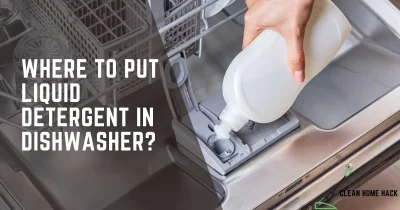Why Does My Dishwasher Smell? [7 Causes of Dishwasher Odors]

 The Short Answer is: The Short Answer is: |
| A dishwasher can smell bad due to various reasons, including old, rotting food, clogged filters, and drainage problems. One of the most common causes of a bad smell is the presence of old, rotting food somewhere inside the unit. To address this issue, you can check the food trap located at the bottom of your dishwasher tub and remove any old food from it. Another common issue that can make a dishwasher smell bad is a water leak, which can cause mold and mildew to grow. If you're not sure what's causing the problem or the above solutions don't help, it's best to call a professional to assess and fix the issue. |
Are you noticing a foul odor coming from your dishwasher? If so, you’re not alone. Many people experience this problem and wonder why their dishwasher smells.
A smelly dishwasher can be caused by a variety of factors, including food particles, grease buildup, and mold growth. In this article, we will explore the topic, “Why Does My Dishwasher Smell” and provide tips on how to get rid of it.
So, if you’re tired of dealing with a stinky dishwasher, keep reading to find out what you can do to eliminate the smell and keep your dishwasher running smoothly.
Table of Contents
Common Causes of Dishwasher Odors
Dishwashers are a convenient appliance that can save time and effort in the kitchen. However, they can sometimes develop an unpleasant smell that can be difficult to get rid of. Here are some common causes of dishwasher smell:
- Dirty filter: The most common cause of dishwasher odor is a dirty filter. Food particles get trapped in the dishwasher’s filter, and without regular cleaning, the filter can start smelling foul. Clogged filters can also recirculate dirty water, causing the dishwasher to not clean properly.
- Clogged drain: Another leading cause of dishwasher odors is standing water. Clogged drains can cause standing water in the dishwasher or in the drain pipes.
- Food particles: Food debris can accumulate in the dishwasher’s filter or crevices of the machine and begin to smell. The dishwasher can transmit the odor to dishes during the drying cycle. Unless the machine is cleaned out periodically, the smell will persist.
- Improper drainage: Wastewater not draining correctly can cause an eggy smell coming from the dishwasher. The wastewater exits the dishwasher through the garbage disposal, if available, before being disposed of. So more often than not, there may be a clog found in the drainage system.
- Soap scum buildup: Food particles trapped in soap scum buildup can cause a smell in the dishwasher.
- Mold and Mildew Growth: Dishwashers are moist environments that can be conducive to the growth of mold and mildew. This can happen if the dishwasher is not properly ventilated or if dishes are left in the dishwasher for too long after a cycle has been completed.
- Hard Water Deposits: Hard water can leave mineral deposits in the dishwasher, which can cause a bad smell over time. These deposits can also cause the dishwasher to work less efficiently.
To prevent dishwasher smell, it is important to clean the dishwasher regularly and to properly rinse dishes before loading them into the dishwasher. It is also a good idea to periodically check and clean the dishwasher filters and to ensure that the dishwasher is properly ventilated.
Cleaning and Maintaining Your Dishwasher
Dishwashers can develop odors due to food residue on the interior walls, mold and/or mildew growth on the gasket seal, or a clogged drain. To prevent odors, it is important to regularly clean and maintain your dishwasher. Here are some steps to follow:
- Clean the exterior: Use a sponge and hot, soapy water to wipe down the exterior of your dishwasher. For stainless steel dishwashers, use a cleaner specifically formulated for stainless steel appliances.
- Clear the filter: Over time, food residue and mineral build-up can clog the dishwasher’s filter and cause unpleasant odors. Remove the filter and wash it with hot water and soap. Use a citric-acid-based dishwasher cleaner to remove deposits monthly.
- Remove food residue: Remove food that drops into the dishwasher during loading and use a rag or paper towel to remove food caught in the drain after each cycle.
- Rinse dishes before loading: Rinse dishes, silverware, bowls, and other items before they go into the dishwasher to prevent debris from collecting and clogging the dishwasher.
- Use a dishwasher cleaner: Use a citric-based dishwasher cleaner to deodorize and sanitize your dishwasher. This will help keep your appliance smelling fresh and running smoothly.
- Regular cleaning: Consider a regular dishwasher cleaning schedule of about every four weeks. If your dishwasher has a bad odor, clean it more frequently.
By following these tips, you can keep your dishwasher clean and odor-free.
Using Natural Cleaners and Deodorizers
Dishwashers are a convenient and time-saving appliance in our daily lives. However, they can sometimes develop unpleasant odors due to the buildup of food particles, grease, and soap scum.
Using natural cleaners and deodorizers can help prevent these odors and keep your dishwasher smelling fresh. Here are some tips to help you achieve this:
- Vinegar: Vinegar is a natural cleaner and deodorizer that can help remove odors from your dishwasher. Simply pour a cup of white vinegar into a dishwasher-safe container and place it on the top rack of your dishwasher. Run a hot water cycle to allow the vinegar to circulate and clean the interior of the dishwasher.
- Baking Soda: Baking soda is another natural cleaner that can help remove odors from your dishwasher. Sprinkle a cup of baking soda on the bottom of your dishwasher and run a hot water cycle. This will help remove any food particles and grease that may be causing the odor.
- Lemon: Lemon is a natural deodorizer that can help freshen up your dishwasher. Cut a lemon in half and place it on the top rack of your dishwasher. Run a hot water cycle to allow the lemon to circulate and deodorize the interior of the dishwasher.
- Salt: Salt is a natural abrasive that can help remove any buildup in your dishwasher. Sprinkle a cup of salt on the bottom of your dishwasher and run a hot water cycle. This will help remove any food particles and soap scum that may be causing the odor.
Using natural cleaners and deodorizers can help prevent odors in your dishwasher. Vinegar, baking soda, lemon, salt, and regular cleaning are all effective ways to keep your dishwasher smelling fresh and clean.
By following these tips, you can ensure that your dishwasher remains a convenient and pleasant appliance in your home.
Addressing Hard Water Deposits
Hard water deposits can cause foul odors to emanate from the dishwasher. Hard water contains high levels of dissolved minerals that can accumulate in your dishwasher over time, obstructing water flow and leading to inefficient cleaning.
These mineral deposits can build up on the dishwasher’s interior, spray arms, and filter, trapping food particles and creating a breeding ground for bacteria.
Over time, these deposits can also damage the dishwasher’s interior and components, reducing its lifespan and efficiency. To address hard water deposits and prevent dishwasher odors, you can take the following steps:
- Scrap Food Before Loading: By scraping your dishes prior to loading them into the dishwasher, you can avoid some food particles getting stuck. Fewer food particles through your dishwasher mean less of a food particle build-up.
- Use Hard Water Detergent: Using a detergent specifically designed for hard water can help prevent mineral buildup in your dishwasher.
- Fill Up on Rinse Aid: If your hard water is at a manageable level (spots but not full dish coating), load up on rinse aid. If your dishwasher has a rinse aid dispenser, fill it up and keep it topped up regularly. If it does not, remember to splash in a little rinse aid (or white vinegar if you’re saving money) for each load.
- Try Baking Soda and Vinegar Rinses: Regular baking soda and vinegar rinses not only help to stop the buildup of lime and hard water, but they also remove any unsavory scents.
By taking these steps, you can help prevent hard water deposits and the resulting odors in your dishwasher.
Frequently Asked Questions Related to Dishwasher Smells:
How to get rid of dishwasher smell?
To get rid of the dishwasher smell, start by cleaning the dishwasher’s interior. Remove any debris or food particles from the dishwasher’s filter, spray arms, and interior walls.
Then, run a cycle with a dishwasher cleaner or a mixture of vinegar and baking soda. You can also leave a bowl of vinegar in the dishwasher overnight to absorb any lingering odors.
Finally, make sure to regularly clean your dishwasher and run it with a full load to prevent future smells from developing.
Why does my dishwasher stink?
A dishwasher can start to smell bad due to various reasons. One of the most common reasons is standing water, which can cause mold to grow inside the dishwasher.
This can also happen if you leave the dishwasher door closed for an extended time, such as while you’re away on vacation.
Food particles could also accumulate in the drain filter, drain hose, spray arm, or elsewhere in the dishwasher. The odor could be especially rancid if the particles are comprised of fish, eggs, or other strong-smelling foods.
To clean a stinky dishwasher, you can clean the drain filter, run two separate cycles with vinegar and baking soda, and wipe away any buildup on the gasket seals. You can also avoid a smelly dishwasher by regularly cleaning and maintaining your appliance.
Why does my new dishwasher smell?
A new dishwasher may smell due to the plastic components and hoses that are used in its manufacturing process. These components can release odors that are trapped inside the dishwasher. Running the dishwasher with a cup of vinegar or baking soda can help eliminate the smell.
How to make your dishwasher smell better?
To make your dishwasher smell better, there are a few things you can do. First, remove any food debris or buildup from the dishwasher’s interior, including the spray arms, filters, and drain.
You can use a toothbrush or a soft-bristled brush to clean these areas. Next, run a cycle with a dishwasher cleaner or a mixture of vinegar and baking soda.
You can also place a cup of white vinegar on the top rack of the dishwasher and run a hot cycle. Finally, make sure to regularly clean your dishwasher and run it with a full load to prevent odors from building up in the first place.
Why does my dishwasher smell like sewage?
A dishwasher smelling like sewage is a common problem that can be caused by a buildup of food particles in the dishwasher’s filter, vents, or drain pipe. Checking these three areas can help narrow down where the bad smell is coming from.
The filter is the first place to check, and it is easy to remove and clean. If the smell persists, it could be due to mold build-up in the dishwasher or backed-up pipes. It is recommended to hire a professional to inspect the vents and drain pipes.
Why does my dishwasher smell like rotten eggs?
A dishwasher that smells like rotten eggs is often caused by a build-up of food particles, as most people are unaware that their dishwasher needs regular cleaning.
Another common cause is that wastewater from the dishwasher is not draining correctly, which can cause a backup of water and food particles. A third reason for the smell could be a buildup of minerals and detergent deposits inside the dishwasher.
To get rid of the smell, you can try cleaning the dishwasher filter, running a cycle with baking soda, or using a dishwasher cleaning product. If the smell persists, it might be a good idea to call a plumber to check for water quality issues.
Conclusion on Why Does My Dishwasher Smell
In conclusion, a dishwasher can develop a foul smell due to various reasons such as accumulated food residue, clogged filters, mold and mildew growth, hard water deposits, and damaged or clogged dishwasher drain hose.
The smell can be off-putting and can affect the cleanliness of the dishes. To eliminate the odor, it is crucial to understand the common causes of dishwasher smell and take effective solutions to address them.
Some of the solutions include cleaning the dishwasher filter, running the dishwasher on the hottest setting with baking soda, descaling the dishwasher, using a dishwasher cleaner specifically designed to remove hard water deposits, and cleaning the garbage disposal.
Taking regular maintenance and preventive measures is crucial to ensure your dishwasher stays fresh and clean, while also ensuring your dishes are thoroughly cleaned.






